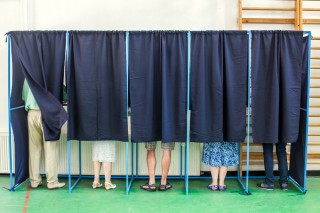 A number of states have laws banning taking photographs in voting booths, with the aim of protecting the integrity of a secret ballot system. Some states prohibit taking pictures of completed ballots, while others bar any photos at polling sites. The rise of camera phones and a culture of sharing selfies has led to legal clashes over what some consider to be First Amendment issues. Snapchat, the social media platform that allows users to take temporary photos and videos that vanish after viewed, has made their opinion known, in an amicus curiae (friend of the court) brief filed against a New Hampshire statute. The case was originally brought by three voters who were investigated for allegedly violating the law in the 2014 primary elections.
A number of states have laws banning taking photographs in voting booths, with the aim of protecting the integrity of a secret ballot system. Some states prohibit taking pictures of completed ballots, while others bar any photos at polling sites. The rise of camera phones and a culture of sharing selfies has led to legal clashes over what some consider to be First Amendment issues. Snapchat, the social media platform that allows users to take temporary photos and videos that vanish after viewed, has made their opinion known, in an amicus curiae (friend of the court) brief filed against a New Hampshire statute. The case was originally brought by three voters who were investigated for allegedly violating the law in the 2014 primary elections.
The state law says:
No voter shall allow his or her ballot to be seen by any person with the intention of letting it be known how he or she is about to vote or how he or she has voted … This prohibition shall include taking a digital image or photograph of his or her marked ballot and distributing or sharing the image via social media or by any other means.
According to court documents, New Hampshire’s argument for the necessity of the law was that it prevented vote selling and coercion. U.S. District Judge Paul Barbadoro ruled against the state, saying there was no evidence that there was “an actual or imminent problem with images of completed ballots being used to facilitate either vote buying or voter coercion.” The decision was appealed, and Snapchat filed their brief in support of the lower court’s decision.
Snapchat said in their brief that besides allowing users to take photos, they also provide services to news organizations, and they produce their own content in covering newsworthy events, including political stories. The brief describes how they have used photos that users have taken from voting booths in their coverage. They claimed that laws such as New Hampshire’s “impose real restrictions on expression and newsgathering as they have evolved in the 21st century.”
The case is scheduled for oral arguments before the First Circuit Court of Appeals in Boston, Massachusetts, on September 13.
Read Snapchat’s brief, first obtained by Ars Technica, below.